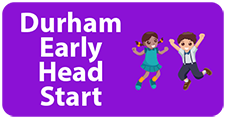Randy’s Five Star Academy has partnered with the Durham Early Head Start Program as of July 2010! Durham’s Partnership for Children has been awarded a grant to establish year-round Early Head Start (EHS) services in Durham. Randy’s Five Star Academy was chosen as one the few! The Partnership has delegated the operation and management of the Durham Early Head Start program (DEHS) to the Chapel Hill Training-Outreach Project, Inc. (CHTOP) which has operated an Early Head Start program in Orange County for over ten years. The DEHS program will contract with high quality child care sites for 60 EHS slots for infants and toddlers. The DEHS program is seeking five-star child care centers (and four star centers which will upgrade to five-star licensure by May 15, 2011) to provide early care and education services to a minimum of 8 and a maximum of 24 children ages 6 weeks to 3 years of age. It is expected that selected four-star programs will work with the CCSA TA department to improve to five-star licensure.
As of 2019- 2020 school year Randy’s Five Star Academy will serve two classrooms for Early Head Start.
Teddy Bears Classroom – 8 children
Busy Bees Classroom – 8 children
There are specific qualifications for children in this classroom and the staff. If interested please call Early Head Start @ 919-439-7107.
In addition to achieving and maintaining a five-star license by May 15, 2011, all funded child care centers serving Early Head Start children must comply with Early Head Start federal regulations. These include, but are not limited to, the following requirements:
- Become informed and supportive of the Head Start philosophy regarding children and families.
- Enroll children for early care and education regardless of race, gender, creed, national origin, social and economic status, or disability.
- Cooperate and support DEHS staff in complying with Head Start Program Performance Standards.
- Cooperate with DEHS staff in following the Durham Early Head Start Eligibility, Recruitment, Selection, Enrollment, and Attendance (ERSEA) Procedures.
- Adhere to EHS facilities requirements such as square footage that allows cribs to be at least 3 feet apart, dedicated diaper-changing areas, child-sized toilets, playgrounds that are separate from those used by preschool and older children.
- Follow EHS guidelines for use of equipment and materials. For example: Cribs are used for sleeping only; limited use of high-chairs; no use of infant seats, swings or other equipment that limits physical development; appropriate floor-time activities; comfortable sitting areas for caregivers to hold or rock or feed children, etc.
- Feed infants and toddlers on demand.
- Use age-appropriate schedules and activities.
- Provide a smoke-free and drug-free workplace.
- Maintain daily attendance records for EHS children.
- Staff infant, toddler, and two-year-old classrooms with a child to teacher ratio of 4:1 with a maximum group size of 8.
- Require a minimum of an Associate’s Degree in Early Childhood for both caregivers in each classroom where EHS children are enrolled.
- Participate in an on-going training and staff development plan developed by the Center and DEHS staff.
- Use an approved curriculum for infants, toddlers, and twos.
-
Initiate and maintain an ongoing child assessment system.
-
With the support of DEHS staff, screen each child upon enrollment for the purpose of identifying potential special needs issues.
-
Support professional staff who provide special services for diagnosed children with individualized Family Services Plans (IFSPs).
-
Incorporate IFSP goals into daily lesson plans and activities.
-
Assess children on an on-going basis and implement individualized education / development plans for each child.
-
Adhere to a discipline policy and practice that prohibits the use of corporal punishment.
-
Follow CACFP and Head Start Nutrition regulations.
-
Support parents as their child’s most important teacher.
-
Provide a minimum of two home visits and two teacher-parent conferences per year.
-
Maintain an ongoing communication system with parents.
-
Encourage the participation of EHS parents as volunteers in the center and provide a model of adult-child interaction that enhances parenting skills.
-
Support the provision of opportunities for EHS parents to be involved in parent committees and to be represented on the DEHS Policy Council.
-
Support a smooth transition of EHS children to Head Start or other early childhood programs.
-
Cooperate with frequent and periodic monitoring by the DEHS staff and consultants.
-
Submit monthly and year-end reports to the Durham Early Head Start program.
-
Provide information for audits and federal reviews as requested.
-
Collaborate to fill vacancies in a timely manner.
-
Provide release time for teachers to complete planning and administrative responsibilities.

